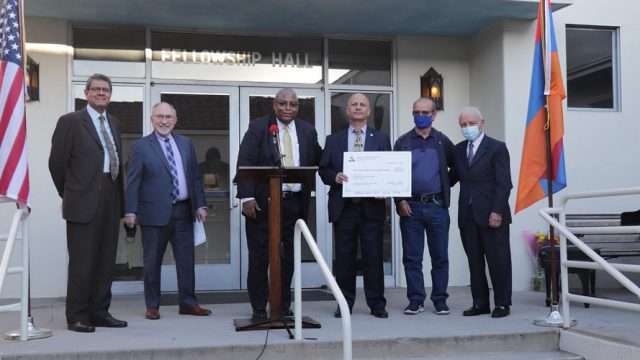Safeguarding Divine Truth

The tired, weary-worn, battle-scarred evangelist was concerned—concerned for the fledgling Christian church. He knew they would soon face ridicule, mockery, imprisonment, and persecution. The apostle Paul gathered the elders of the Ephesian church together at Miletus and warned them that “savage wolves will come in among you, not sparing the flock” (Acts 20:29). Difficult times loomed on the horizon. There was trouble ahead. Believers were soon to face fierce persecution in the Roman Empire.
Nevertheless, this was not Paul’s only concern. His deeper concern may well have been the challenge from within the Christian church itself. He counseled these church leaders: “Also from among yourselves men will rise up, speaking perverse things, to draw away the disciples after themselves. Therefore watch, and remember that for three years I did not cease to warn everyone night and day with tears. So now, brethren, I commend you to God and to the word of His grace, which is able to build you up and give you an inheritance among all those who are sanctified” (verses 30-32).
The New Testament church leaders’ concerns about erroneous teachings entering the New Testament church were well founded. Paul warned young Timothy about Hymenaeus and Philetus, who declared that the resurrection had already taken place (2 Tim. 2:17, 18). He wrote to the Galatians about righteousness by faith in Christ alone at a time when some were leading believers back to dependence on the law as a means of salvation. The apostle Peter warned the church that “there will be false teachers among you, who will secretly bring in destructive heresies” (2 Peter 2:1). Writing in Revelation 2, John warns against the Nicolaitans, who did away with the law of God and lived lives of unrestrained indulgence (Rev. 2:14, 15).
SAFEGUARDING DIVINE TRUTH
Christian leaders must always be concerned about maintaining the integrity of the biblical, Christ-centered truths of divine revelation. Here is my simple point: church leadership on all levels has the solemn responsibility before God to nurture believers in Christ, safeguard and proclaim biblical truth, and prioritize mission.
What does this specifically mean for the Seventh-day Adventist Church today? It should not surprise us that erroneous teachings are sometimes taught in our Sabbath School classes, from our pulpits and in our classrooms. The devil’s strategy is to erode the very essence of Adventism. If the Seventh-day Adventist Church is merely another denomination, what unique message can we offer to the world? If the Seventh-day Adventist Church is not a divine movement raised up by God with a special message for the world to prepare a people for the coming of Jesus, why send missionaries to the ends of the earth? If as Adventists we lose our prophetic identity, our message to the world will lose its power.
THE MARK OF THE BEAST
Let me be more specific. Adventist identity is tied closely to our prophetic understanding. Subjects like the sanctuary, the 2,300 days, 1844, the coming crisis over the law of God and the Sabbath, the three angels’ messages, and the mark of the beast are part of our DNA. To downplay or minimize the prophetic scenario of last-day events calls into question the great prophetic truths of Daniel and Revelation.
The prophet Daniel speaks of the rise of Babylon, Medo-Persia, Greece, Rome, and a little-horn power rising out of pagan Rome’s 10 divisions that would attempt to change “times and law” (Dan. 7:25). Revelation 12 speaks of an end-time remnant who “keep the commandments of God and have the testimony of Jesus” (Rev. 12:17). Revelation 13 speaks of a time when loyalty to God means facing an economic boycott and no one will be able to buy or sell unless they receive the mark of the beast. Eventually a death decree will be enforced on believers (Rev. 13:15-17).
Revelation 14 announces the last-day messages of the three angels. It reveals that the “everlasting gospel” will be proclaimed by a Spirit-filled church to “every nation, and kindred, and tongue, and people” (Rev. 14:6, KJV). In the light of heaven’s end-time, pre-Advent judgment, the first angel calls men and women to worship the Creator (verse 7). In contrast to those who worship the Creator, there are those who worship the beast (verse 9). This final crisis of the great controversy between good and evil develops a people who through the power of the Holy Spirit “keep the commandments of God and the faith of Jesus” (verse 12).
DIFFERENCE FROM SEVENTH DAY BAPTISTS
More than 100 years ago Ellen White wrote to an Elder K, who, although he believed the Sabbath, minimized its relationship to lastday events and the coming crisis. Her words are extremely instructive for the church today. Elder K’s sentiments are still expressed by some. She wrote, “As far as the Sabbath is concerned, he occupies the same position as the Seventh Day Baptists. Separate the Sabbath from the messages, and it loses its power; but when connected with the message of the third angel, a power attends it which convicts unbelievers and infidels, and brings them out with strength to stand, to live, grow, and flourish in the Lord.”¹
This is an extremely significant statement. Seventh-day Adventists have rightly understood the relationship between Christ’s judgment-hour ministry in the heavenly sanctuary, the law of God, the Sabbath, and the final events of this world’s history as outlined in the book of Revelation. When the Sabbath is “separated” from the third angel’s message, which warns against receiving the mark of the beast, and the final events connected with that message, the Sabbath loses its power. Although God continues to reveal new understandings of truth to His people and new truths shine with beauty from His Word, new truth never obscures previously discovered truths. Since God is the originator of truth, future revelations will never negate what He has previously revealed. We may see new aspects of our prophetic understanding, but we can never logically dismiss previous revelations of truth God has given to His people. We would do well to ponder this statement:
“Every truth that He [Christ] has given for these last days is to be proclaimed to the world. Every pillar that He has established is to be strengthened. We cannot now step off the foundation that God has established.”² We can expect the very foundations of our faith to be shaken, but, as Jesus declared, “Upon this rock I will build my church; and the gates of hell shall not prevail against it” (Matt. 16:18, KJV). In Christ, His church will triumph at last.
The Bible’s final book describes a people who are redeemed by Christ’s grace, transformed by His power, and motivated by His love. The hope of His soon return inspires them to passionately share the good news of the gospel to the ends of the earth. Adventism at its best is a Christ-centered, Bible believing, grace-filled, prophetic movement, compassionately caring for others, with an urgent message of hope for a dying world. May we rise to fulfill our destiny and accomplish the mission He has called us to complete!
¹ Ellen G. White, Testimonies for the Church (Mountain View, Calif.: Pacific Press Pub. Assn., 1948), vol 1, p. 337.
² Ellen G. White manuscript 129, 1905, in Ellen G. White, Manuscript Releases (Silver Spring, Md.: Ellen G. White Estate, 1993), vol. 20, p. 151.








